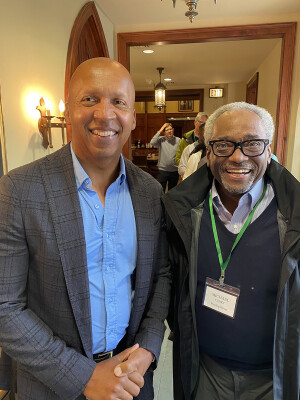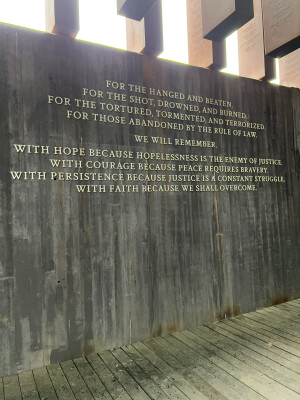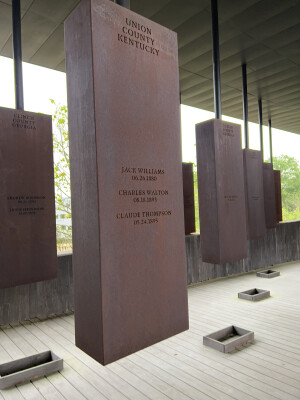Dear Friends,
Last week I attended the House of Bishops meeting held at the Diocese of Alabama’s Camp McDowell, located near Jasper, Alabama. As part of our gathering, we made a pilgrimage to racial justice sites in the city of Montgomery, Alabama: the state’s capital and a prominent location in the civil rights movement.
Our trip focused on two sites developed by the Equal Justice Initiative; the Legacy Museum and the National Memorial for Peace and Justice. The museum, provocative and haunting, examines the 400-year span of American racial oppression. Beginning with a presentation on the colonial era’s chattel slavery, the museum moves through Jim Crow segregation and concludes with an examination of modern mass incarceration.
The memorial draws attention to thousands of lynching victims during the post-Civil War period. If you believe lynchings only took place in the south, you will be surprised to see states like New York, Ohio, Kansas and California listed as lynching sites. The Equal Justice Initiative has documented more than 4,400 lynchings of Black people in the United States between 1877 and 1950, which is 800 more lynchings than had been previously recorded.
Like the 9/11 Museum, a visit to the Legacy Museum and the National Memorial for Peace and Justice leaves the visitor emotionally spent. I was deeply moved by what I saw and these vivid and educational presentations give one no other option than to look deeply into the face of the most frightening evil. L. M. Browning in Seasons of Contemplation: A Book of Midnight Meditations, writes,
“The purpose of a pilgrimage is about setting aside a long period of time in which the only focus is to be the matters of the soul… we do not need to go to the edges of the earth to learn who we are, only the edges of our self.”
These words were included in the guide to our pilgrimage:
“We embark on a pilgrimage to seek the holy, to encounter the Divine, and to walk together as soulmates for a time. This pilgrimage will be hard, it will require us to bring our best selves, to enter the space of uncomfortably, to sit with the many emotions. It will be hard but will also be holy. When we encounter the border of the holy, our best response is the awe of silence. We need not fill the silence. Silence is not the absence of words, but the presence of self.
Be aware of your self, your soul, your spirit. Be aware of others whose journeys are different, and who will encounter this time of pilgrimage from the myriad of experiences that have shaped and defined them, as yours has defined you, as unique children of God. Be fully present. Embrace the holy on this journey. This will be unlike anything you have done before which means we must be open to facing the hard truths of our past. You will be changed. Change is hard, but change is also holy.
Today we are all pilgrims, sojourners, wayfarers, on a journey to encounter the holy, to venture deeper into our selves, and discover the path for the road ahead.”
During this season of Lent, let us not be content to merely confess our individual sins. Let us also examine our collective misdeeds and our corporate evil. Let each one of us travel to “the edges of our self” where we will discover who we are… and who God intends for us to become.
Faithfully,

The Right Reverend Dean E. Wolfe
Rector

Bryan Stevenson, left, executive director of the Equal Justice Initiative, spoke to the House of Bishops on March 9 at St. John’s Episcopal Church in Montgomery, Alabama. Here he poses for a photo with Presiding Bishop Michael Curry. Photo: The Episcopal Church
The bishops’ pilgrimage followed in the footsteps of the church’s Executive Council, which visited some of the same sites during its October 2019 meeting in Montgomery. During both trips, Episcopal leaders heard from Bryan Stevenson, the civil rights attorney who founded the Equal Justice Initiative and spearheaded the creation of the museum and memorial, which opened in 2018. On March 9, Stevenson spoke to the bishops during a stop at St. John’s Episcopal Church in downtown Montgomery.
“We went to Montgomery not as tourists to consume, but as pilgrims to pray,” Presiding Bishop Michael Curry said in a written statement to Episcopal News Service. “We went on pilgrimage to holy places to remember those enslaved and abused in the institution of chattel slavery – and the martyrs and witnesses who labored for a society in which there is ‘liberty and justice for all.’ … We went as pilgrims following Jesus and his way of love.”


National Memorial for Peace and Justice
